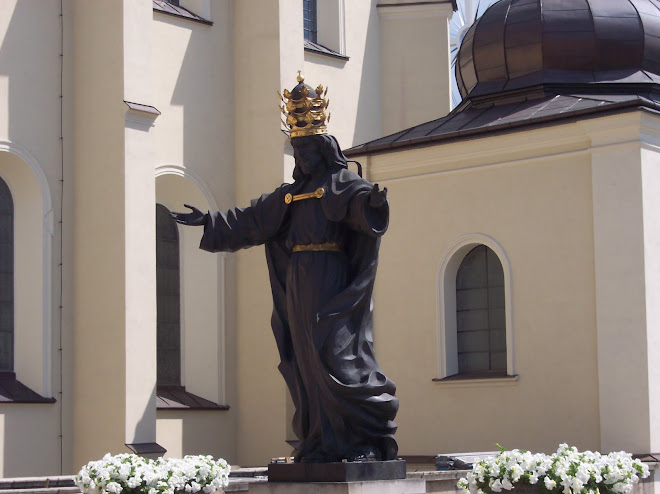The bus is old, Russian, cramped, packed, and without seat belts, equipped with a malodorous lavatory, and never reaches a speed above the legal maximum of 54 miles per hour. There are fewer seats than tickets sold, so one young man has to travel for 11 hours in the windowless sleeping compartment, intended for the driver, which is below the passengers.
Yet every year about half a million Poles travel, as I did last weekend as a pseudo-Pole, on a pilgrimage to the Church of Our Lady at the Gate of Dawn (Ostra Brama) in Vilnius, Lithuania. Vilnius was originally in Poland, and the Church is very Polish, and the focus of many pilgrimages.
The Gate itself is a beautiful piece of Baroque, and the painting of the Blessed Virgin can just be made out below, seen through the window over the arch:
Also on the pilgrims' list are the Polish cemetary where the dead of the Polish-Soviet War are buried:
The heart of General Piłsudski is also buried there:
A better picture. The incomplete lines at the bottom of the picture are from Juliusz Słowacki (1809-1849) who lived in Vilnius. I am trying to find the complete poem.
The Cathedral of Ss. Peter and Paul is very beautiful:
It has a remarkable hanging metal sculpture of the Barque of Saint Peter:
There are many more holy places to visit and pray at.
The pilgrimage is well worth the horrible journey.














































8 comments:
Very nice photos. You have a talent for photographing religious sites, similar to John Sonnen. You should do more pilgrimages. Good for you, good for us readers. :-)
Do you by any chance have a transcription of the Piłsudski epitaph? I can read the Mother and Heart of the Son but the nearer and further inscriptions are hard to read.
Is Lithuania experiencing a rebirth of the Faith? I grew up in a neighborhood of Irish, Poles, Italians and Lithuanians and we were all Catholic at the same parish and in the same school. Good rivalries. Good ethnic foods too. Except the Irish. :-( My introduction to Italian and Polish cuisine. It's stayed with me. Unfortunately I don't remember all that much about distinctively Lithuanian dishes.
Thank you for the complement, and my apologies for the truncated photo. I have a slightly better, though incomplete one which I'll put up tonight.
The inscription at the foot of the slab is a quotation from Słowacki. When I can find the source and the rest of the quotation I'll post tha here too.
Lithuanian food is very good - huge pierogi, blini, and zepellins - airship-shaped pierogi full of pork or twaróg (cottage cheese), lying in a pool of sour cream.
More later!
Jack O'Malley - P.S. Lithuania, at least Vilnius, seemed very Catholic.
Your bus journey sounds much like ours in West Wales Chris (except that we do not have the pilgrims to go with it). God bless Poland (and Lithuania).
Richard - I hope you had packed good food and JD (in our case, vodka) for the trip as we had!
And God bless Wales - and you!
Thanks for the new photo.
I googled a couple of the words and found the Polish wikipedia article.
Here is the epitaph from the article:
u góry:
Ty wiesz, że dumni nieszczęściem nie mogą
Za innych śladem iść tą samą drogą.
u dołu:
Kto mogąc wybrać, wybrał zamiast domu
Gniazdo na skałach orła, niechaj umie
Spać, gdy źrenice czerwone od gromu
I słychać jęk szatanów w sosen szumie.
Tak żyłem.
między nimi:
Matka i Serce Syna
My rough translation:
Who, being able to choose, chose instead of home
an eagle's nest on the cliffs, let him know how to sleep,
when the pupils (are) red from thunder (?)
and the wailing of demons is heard in the roar of the pines.
Thus I lived.
I don't really get the "pupils/eyes red from thunder" allusion. There is probably some
metaphorical connotation to źrenice that I have missed.
The top lines:
You know that the proud unfortunately cannot
go the same road in the footsteps of others.
Jack O'Malley - thank you very much for the link and the translation. Your grasp of Polish puts mine to shame.
I think that "grom" here may be "thunderbolt", hence the red eyes.
God bless!
Not really - you've got the gist of grom that I missed. I only have a small Polish-English dictionary so that unless there is a clear relation to Russian I probably will miss it ( and I did! ).
Thanks again for the beautiful pictures. Do some more pilgrimages! Maybe by car this time? :-) Matka Boska Częstochowska, może? Still, I'd guess that the camaraderie of traveling in a bus might compensate for the lack of physical amenities. Friends, newly made and old, are the ancillary graces of a pilgrimage, since the object is the worship of the grace-giving Godhead.
Love the blog. Poland (and Lithuania too) is a hearth of the True Faith. Would that Ireland return to it.
Post a Comment